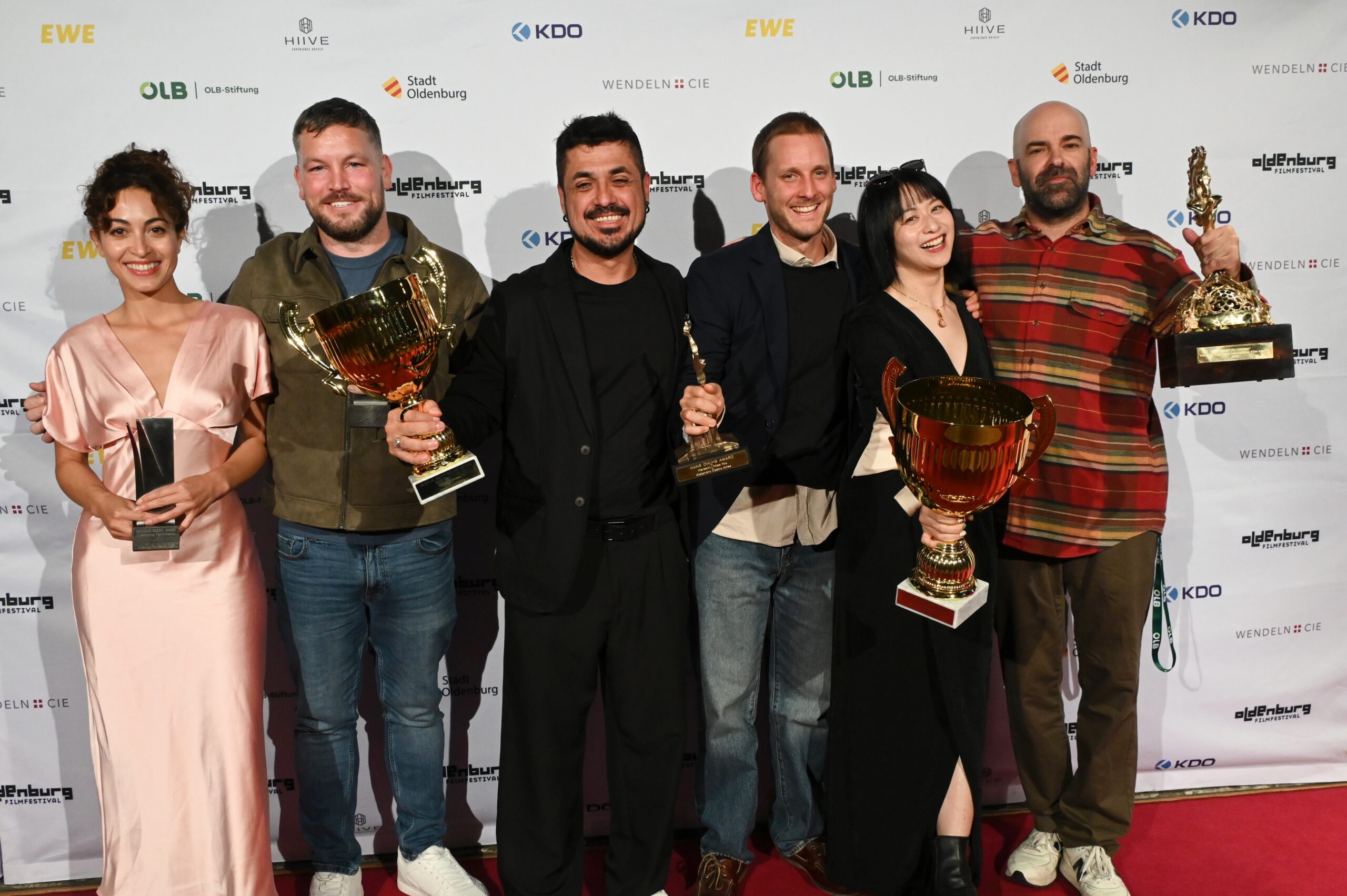Oldenburg Film Festival 2025: The Verdict
.
VERDICT: The indie film event par excellence returned over an inspiring five days filled with bold and creative filmmaking from brutal dystopian pregnancy dramas to charming mental health love stories.
The word that seemed to be on every pair of lips at this year’s Oldenburg Film Festival in Lower Saxony was ‘inspiring’.
Whether it was audiences emerging blinking into the light of day after their most recent cinematic trip, or filmmakers reflecting upon the environment of collaboration and mutual support they found themselves in, everyone seemed to be taking inspiration from the vibe and the programme at this year’s festival. In accepting her award for originality, daring and audacity, Yun Xie, director of Under the Burning Sun (read our review here) said she genuinely didn’t believe she’d be in contention for the award because “the whole week I was so overwhelmed by how talented everyone was.”
This might sound typical of paying homage to the other contenders for an award, but at Oldenburg that passion for each-other’s work rings loud and clear. Alejandro Castro Arias began the Q&A following his debut feature, Harakiri, I Miss You by ardently recommending that people check out Christian Genzel’s documentary about Howard Ziehm, Finding Planet Porno. During the post screening conversation at the world premiere of Jason Byrne and Kevin Treacy’s Crazy Love, one of the directors of Horseshoe raised his hand to thank the duo for all of the support they’d provided to help him through his own debut.
Crazy Love and Horseshoe share an Irish connection that was particularly prevalent at this year’s festival, with there being a celebration of the nation’s cinema that included three feature films, two shorts and a reception held at Oldenburg Castle and hosted by the Irish ambassador to Germany Maeve Collins who also spoke at the festival’s opening gala. The quality of what was on show this year across the five films was incredible. Edwin Mullane and Adam O’Keeffe’s deft family drama Horseshoe (read our review here) featured four squabbling siblings all wrestling with their own personal childhood trauma. Mullane also had featured a short film called A Day in the Sun, which the jury gave a special mention by evoking Kafka: “We went to the movies and cried.”
The same was doubtless true for many who saw the world premiere of Crazy Love, and beautiful and poignant romantic drama set in a psychiatric hospital. Filled with fantastic performances across the board, it was nonetheless dominated by the two leads, Jade Jordan and John Connors, the latter of whom picked up Sunday evening’s award for Best Performance by an actor at the festival. Connors was actually in all three of the Irish features at the festival this year and it says a lot about the moment he is having that he could just as easily been award for Re-Creation, this writer’s personal highlight a festival. A stunning speculative jury deliberation re-framing 12 Angry Men to debate the real-life case of the murder of Sophie Toscan du Plantier in County Cork in 1996 and the guilt of prime suspect Ian Bailey (read our review here). Directed by David Merriman and Jim Sheridan, and also starring Vicky Kripes, it’s an intellectually and emotionally insightful piece. Finally, Rosie Barrett’s Mouse managed to pack as much tension into its 17 minutes as some of the other stand-outs at this year’s festival (read our review of Mouse here).
It was not just Irish film on show, though, as cinema from across the globe has been celebrated. The Best Short Film winner, Jorge Florez Arcila’s The Flower of Fear, which uses nightmarish fantasy to examine the abduction of child soldiers in Colombia. Vincent Grawshaw’s Keep Quiet picked up the Spirit of Cinema Award for its depiction of an Indigenous police officer, played by Lou Diamond Phillips, attempting to avoid gang war on the reservation – it was arguably the film that had the most tongues wagging as audiences seemed to hugely enjoy it. Sabrina Amali picked up the festivals Best Actress award for her role in Nancy Biniadaki’s Maysoon, which centred on an Egyptian archaeologist working in Berlin who is haunted by memories of the Arab Spring.
The German Independence Award for Best Film went to Ondrej Provaznik’s Broken Voices (read our review here), which is a devastating drama about lost innocence based loosely on the events surrounding the Bambini di Praga, a Czech girl’s choir that was found to have been rife with sexual abuse throughout the 90s. It’s a brilliantly constructed examination of the ways that this can be allowed the happen and the impact it has on the victims, anchored by an astonishing performance from the teenage Katerina Falbrova.
Finally, the Best First Film Award, presented in conjunction with Hans-Ohlms-Stiftung went the aforementioned Harakiri, I Miss You. A bold and challenging portrayal of toxic masculinity and explosive male friendship, it’s a hugely impressive first feature and one that marks director and star, Alejandro Castro Arias, out as a talent to be watched. In his acceptance speech, he spoke about having submitted the film to many festivals around the world and being so disillusioned that he was about to upload it to YouTube when the call came from Oldenburg. That he has come away from the festival with renewed confidence and vigour is testament to Oldenburg’s influence but that his film screened at all, is testament to its commitment to champion new, exciting and creative voices. The were 16 films across the programme that would have been eligible for a first film award and one other debutant, Yun Xie summed it up when accepting her award for Under the Burning Sun: “As an Asian, immigrant, woman of colour, it often feels as though I am not being heard, but today everything is worth it.” The power of Oldenburg shines again, across an invigorating and inspiring five days in Lower Saxony.


